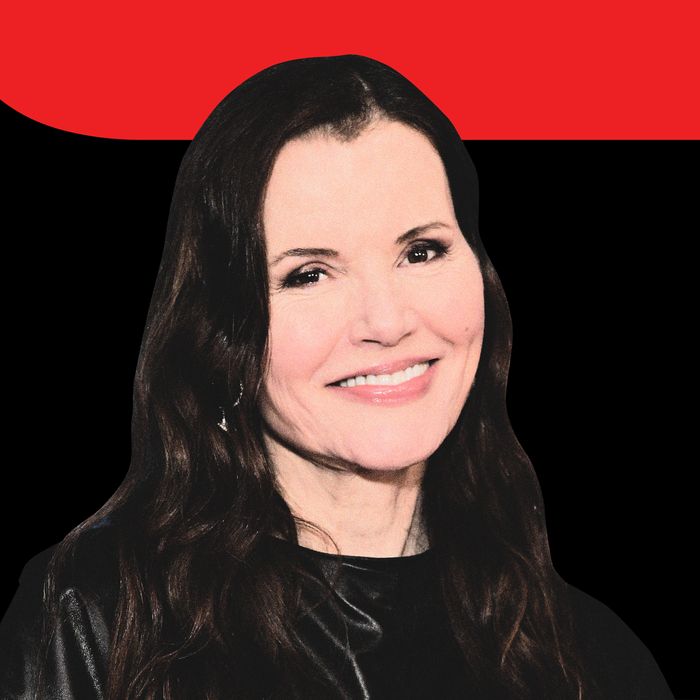
It should come as no surprise to anyone anymore that women in the media have regularly had to endure horrifying and humiliating treatment from powerful men in the business, and not only in response to efforts to achieve some measure of equality in the profession. Geena Davis, an Academy Award winner with a long and successful career in Hollywood, has certainly experienced her fair share of these encounters but only recently opened up about them publicly in her new book, Dying of Politeness: A Memoir. In the latest episode of On With Kara Swisher, Kara talks with Davis about the book, her efforts to achieve gender parity for women in the movie business, and how awesome Cutthroat Island is.
They also discuss the abusive power dynamics Davis has faced and her struggle to stand up for herself. In the segment of their conversation excerpted below, Swisher asks Davis to recount the particularly painful experiences she had with the actor Bill Murray on the set of the 1990 film Quick Change.

On With Kara Swisher
Subscribe on:
Kara Swisher: One big part of representation in the media is the barriers women have overcome about not just recognition but also experiences. You talked about being acquiescent on the set. Your story about Bill Murray was fascinating. There was harassment issues from Jack Nicholson. But the incidents were more with Bill Murray — you called them awful and devastating. Talk a little bit about this because it’s a lot about diminishing you or making you behave. You kept talking about this idea. Explain what he made you do.
Geena Davis: Right. So I went to meet with Bill Murray and his co-director and a producer in a hotel suite. And, uh, I came in and went to sit down with everybody sitting there. But, uh, Bill Murray popped up and said, “Hey, have you ever tried the thumper?” And I’m like, “What?”
Kara Swisher: This was what year? What year was this?
Geena Davis: I wanna say ’89.
Kara Swisher: Mm-hmm. Okay.
Geena Davis: Maybe. Something like that. And, “No. What’s that?” “Well, well, come try it. Come try it.” “No, no, no.” I’m just laughing and trying to sit down. “No, no, no, no, no, no. Come, come. It’s, it’s this …” And you point, there’s a giant massage device on the bed with big handles on it. And he says, “Lay down here. I wanna try it on you.”
Geena Davis: And I’m like, “No, no, no, thank you.” And he keeps at it. He keeps at it. And I keep saying “No” to the point where I would’ve had to scream at him, “Stop fucking asking me! I am not doing it. Do you understand?” Which I was far too timid to do.
So I perched on the corner of the bed and let him do it, and he did it for like one second, and then didn’t ask how I liked it or anything. So I realized it was just to see if he could force me to do something inappropriate.
Kara Swisher: And the other men in the room did nothing, correct?
Geena Davis: They did nothing. No. And I looked to them hoping they would say, “Come on, Bill, give it up” or something. But they didn’t. And I found out that it was because he — I had just won the Oscar, and he had told the others that he was very concerned about hiring me in case I thought I was all that, you know, in case I had a swelled head from that. And so that was his first, uh, test.
And evidently I passed. And then, the first day of shooting, we were shooting a huge scene out on an intersection in Manhattan with hundreds of extras and giant crew and all that stuff. And they said, “We’re ready for you to come to set.” And I said, “Well, costumes asked me to wait here one second. Can I do that, or should I come with you?” He said, “No, no, no.” The AD said, “No, go ahead. Wait here.”
And then, seconds later, Bill Murray — in a full clown costume, by the way — slams into the trailer with, you know, rage coming out of his eyeballs and starts screaming at me and swearing at me: “Get the fuck out there! What the fuck are you doing? Move! Move!” And he got behind me and screamed in my ear, “Move! Move faster! Move it!” And we’re getting to this intersection where there’s hundreds of people watching this, and he keeps it up and keeps it up until he says, “Stand there” and points to a mark on the pavement and starts shooting.
Geena Davis: And I was literally shaking, and he elbowed me after a few takes. He said, “What’s up with you? Come on, come on. It’s all good.” And, uh …
Kara Swisher: He got you in line. He got you in line. That’s what he was trying to do.
Geena Davis: And the point was it wasn’t necessary, you know — it wasn’t, like, an urgent matter for me to go there. I learned that it wasn’t, but he got the opportunity to really put me in my place and really shamed me and, uh …
Kara Swisher: So, just so people know, Bill Murray’s been accused of a lot of inappropriate behavior. Solange Knowles. Allegedly grabbed her hair. Lucy Liu. There’s lots and lots. And recently he’s been pulled off of something. When you think about that — go ahead. Sorry. Go ahead.
Geena Davis: I was gonna say, but, it’s still, just talking about it actually, it’s still — it’s very emotional for me because I felt so ashamed, you know, for somebody who wants to do things right. You know? And I felt so ashamed of that. I didn’t, my … um, sorry —
Kara Swisher: That’s okay.
Geena Davis: My agent and my manager came that day to take me to lunch. You know, fun. Yay. You’re starting the movie — take me to lunch.
And I didn’t tell them.
Kara Swisher: Mm-hmm.
Geena Davis: And I never told anybody until I wrote the book. And it’s just a shame that I took on blame for that happening, you know?
Kara Swisher: Yeah. You know, one of the things— and I’m so sorry; don’t be so hard on yourself. It’s very hard to — unless you’re particularly aggressive — to be aggressive back at that kind of thing; it’s like getting mugged. It’s not your fault that you got mugged.
Geena Davis: Yeah.
Kara Swisher: I think one of the issues, if it’s not explicit sexual harassment, people think, Oh, it’s just yelling. It’s the same thing. It’s the same abuse. It’s the same control. You know, sexual harassment is not about sex; it’s about control. It’s about putting people in their place and it’s about power.
This interview has been edited for length and clarity.
On With Kara Swisher is produced by Nayeema Raza, Blakeney Schick, Cristian Castro Rossel, and Rafaela Siewert, with mixing by Fernando Arruda, engineering by Christopher Shurtleff, and theme music by Trackademics. New episodes will drop every Monday and Thursday. Follow the show on Apple Podcasts, Spotify, or wherever you get your podcasts.
More From 'on with kara swisher'
- Ron Klain Still Thinks Biden Got a Raw Deal
- Gretchen Whitmer on Why She’s Still Confident in Biden
- AOC on Gaza, Insults, AI, and Whether Trump Will Lock Her Up





























